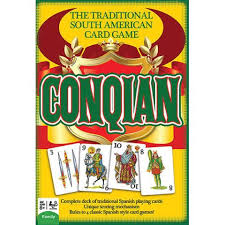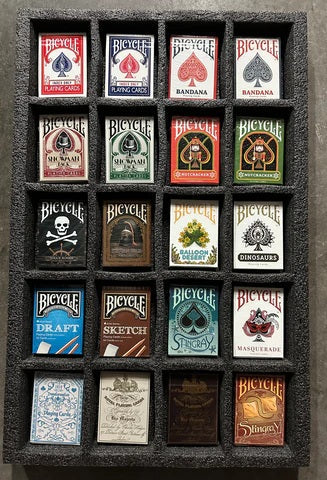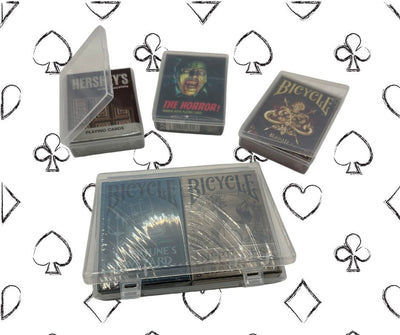(Above shows two Conquian hands in the middle of gameplay)
Card Game Rules
Conquian is a two-player rummy type game and is played with standard playing cards. In Conquian, the 10s, 9s, and 8s are removed to form a 40-card deck. Kings are high and Aces low. The objective of Conquian is to be the first to meld 11 cards.
For more Rummy type games, check out our guides for Gin and Canasta.
Set Up
Before the game can begin, an initial dealer must be selected. To do so, players will pick a random card from a shuffled deck. The player with the lowest card is the dealer. Ties are broken with redraws. The dealer then shuffles the deck and passes out 10 card one by one to each player. The remaining cards form the stock and are placed face down in the middle of the gameplay area.
How to Play
Melding
Players are able to lose their cards by melding. A meld is either 3 or 4 cards of the same rank or 3 or more cards of the same suit in sequence.
Gameplay begins with the player opposite of the dealer. At the start of their turn, players will select a card either from the stock pile or the discard pile. The card can only be kept if it can be used in a meld. If it can’t, it is placed face up in the discard pile next to the stock pile. If a player can use the card selected, they may also play any other melds in their hand. A player’s turn ends with them discarding a card.
The first player to meld eleven cards wins the game.
If the stock pile runs out, the game ends in a tie
For more information about Conquian and its rules, check out Wikipedia's article here or Pagat's article here.
History

(Two people playing Conquian in the 1930s)
It has been well cited that Conquian is a forerunner of the popular game Gin Rummy. Game Historian R. F. Foster notes how the game appears to have begun around the 1860s near the Rio Grande Valley, on the border of Texas and Mexico. This stipulated that the name originated from the Spanish “con quién” or “with whom”. David Parlett, however, notes the Chinese origins of many Rummy type games and stipulates that Conquian is an Americanized version of the Chinese game Kon Khin. Parlett goes on to suggest that maybe Chinese immigrants in the Mexican-Texan territory entwined their Kon Khin with the Hispanic game Chinchón to form Conquian.
For more information about the history of Conquian, check out David Parlett’s article on Gin Rummy here.
Looking for more card games to play? Check out this article:
40+ Great Card Games For All Occasions
About the author: John Taylor is a content writer and freelancer through the company Upwork.com. You may view his freelancing profile here. He has a B. A. in English, with a specialty in technical writing, from Texas A&M University and a M. A. in English from the University of Glasgow. You may view his previous articles about card games here and his LinkedIn profile here.






